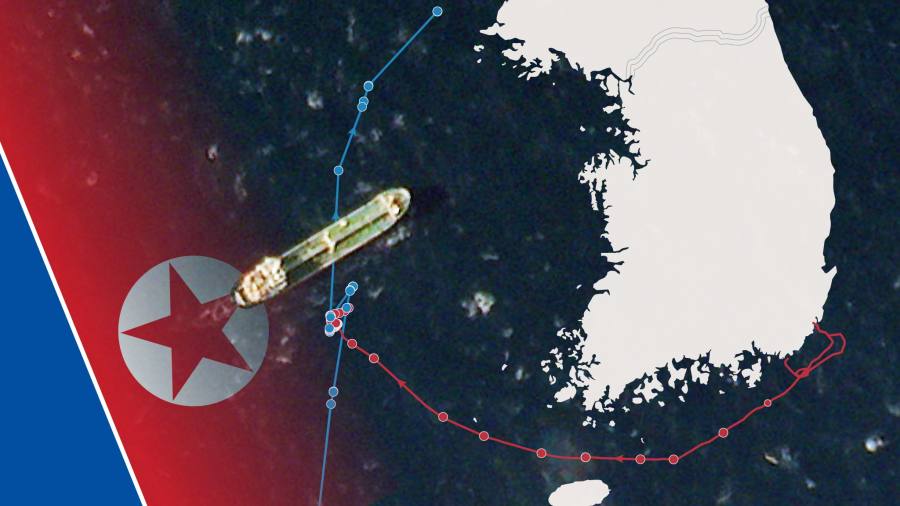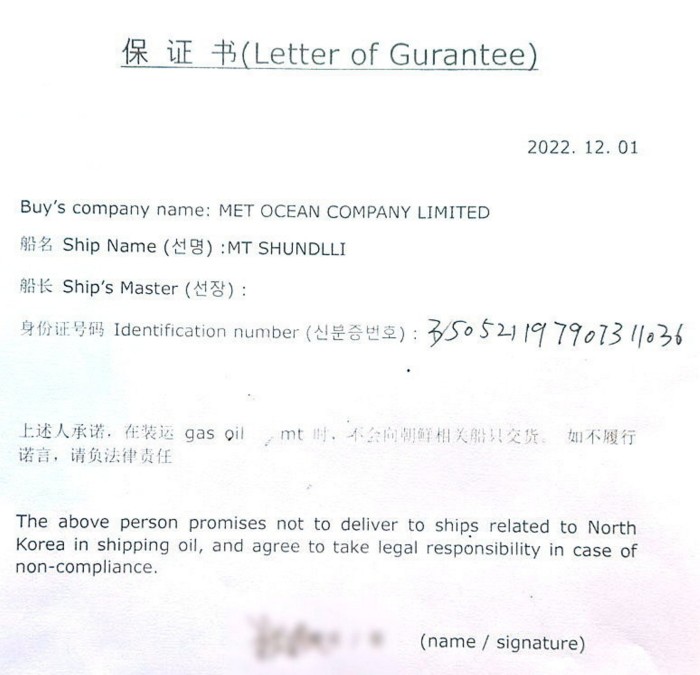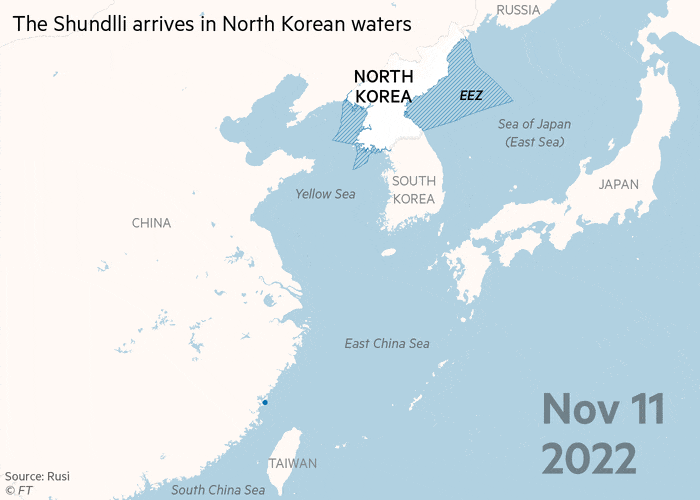North Korea fuel transfers shed light on murky Asian oil trade

A Russian tanker chartered by a South Korean company was spotted transferring fuel to a Chinese vessel bound for North Korea.
A joint investigation by the Financial Times and the Royal United Service Institute think-tank tracked shipments of ship oil from South Korea’s southeastern coast to North Korea’s exclusive economic zone.
Shipment progress documented by satellite imagery and transponder data Difficulties in enforcing strict international sanctions countries such as North Korea.
The cargo left South Korea’s Gunsan port on November 20 on the Russian-owned tanker Mercury chartered by a South Korean company. On 25 November she entered the Yellow Sea between China and the Korean peninsula, and on 1 December she anchored for several hours alongside a Chinese-owned vessel called Shundi.
Data from Mercury’s automated tracking system recorded the change in vertical distance between the water surface and the ship’s lowest point, known as the draft change, after encountering Shundori. This suggested that the cargo had been unloaded during the meeting, and was later confirmed by the South Korean company that chartered the Mercury.
Four days later, Shundlli entered with the Togo flag north korea‘s exclusive economic zone and was docked at a location near the Port of Nampo known to be used for illegal oil deliveries, according to RUSI.
A satellite image taken by US earth observation company Planet Labs and seen by the FT shows Shundli alongside another ship in North Korea’s EEZ. RUSI experts said it was likely a ship-to-ship transfer to a North Korean vessel. Although Shundri has not broadcast a draft, its location data indicates that it was in her EEZ in North Korea for several days. The ships we encountered were not transmitting any data at all.
Ship-to-ship transfers have a legitimate function, but they are sometimes used to hide the origin of cargo or the route of transportation.
North Korea is subject to sanctions agreed by the United Nations Security Council in 2017 that limit oil shipments to North Korea to 500,000 barrels per year, well below energy needs. All such transfers must be reported to the United Nations Sanctions Commission, but only a small percentage of them actually occur.
Mercury is owned by Nico Corporation in the Russian Far East city of Vladivostok, whose ships were chartered by other companies and had no control or visibility of what they did under contract.
“Simply put, our ship is on rent,” said Andrei Velikorodny, director of Niko. “It is to load cargo in South Korea and, according to the charterer’s instructions, to refuel Korean and Chinese fishing vessels in the Yellow Sea,” he added, referring to the process of refueling ships at sea. did.
Velikorodnyi shared a deal with the FT showing Mercury was chartered by a South Korean company called Eastern Peck. Dongpec has confirmed it has chartered the Mercury and conducted ship-to-ship transfers with Shundori as part of a deal agreed with a South Korea-based “Chinese agent” to fuel Chinese fishing vessels. .
Eastern Peck said it was the first to work with a Chinese shipping company, which declined to be named because of South Korea’s data protection law.
Eastern Peck added that agents denied the cargo had been brought into North Korea’s EEZ, but had not explained its whereabouts. He said he received a letter of guarantee confirming that it would not be transferred.
Eastern Peck’s counterparty was a Shanghai-based company called MetOcean Co., Ltd., according to a copy of the guarantee provided by Nico to the FT, signed on the day of the transfer between Mercury and Shundri.
In the letter, MetOcean “commits and agrees not to deliver to ships associated with North Korea in the transportation of oil.”[s] Take legal responsibility in case of violation. ”
“We will continue to protect [by] Laws and all sanctions,” Eastern Peck said. “Despite our best efforts to avoid this situation, we are very sorry to have encountered it. [it].We cooperate in good faith [an] Investigation [be] made by [the] authorities. “Eastern Peck did not respond to a request for comment on the veracity of the letter of undertaking.

A company called Met Ocean appears in a Panama Papers leak of millions of files from Mossack Fonseca, one of the largest offshore law firms. Met Ocean is registered in the British Virgin Islands and its shareholders are linked to their Shanghai address.
Met Ocean does not appear to have a website, but two relevant email addresses did not respond to requests for comment. The FT also spoke by phone with a person listed online as a company contact. The person confirmed his identity and his involvement in the shipping industry, but he refused to discuss the content of the story.

RUSI researcher Joseph Byrne said the Shundri’s movements were very similar to those of other ships previously shown to be involved in the illegal transport of petroleum products to North Korea. rice field.
He added that all ship-to-ship transfers between North Korean and non-North Korean ships are prohibited due to a blanket ban imposed by the United Nations. It doesn’t matter if you are transporting goods on a North Korean-flagged vessel, it is a violation of UN Security Council resolutions,” Byrne said.
Under previous ownership, Shundlli was involved in smuggling petroleum products into China between 2017 and 2019 as part of a scheme to avoid import duties, according to Chinese court records. rice field.
The vessel is now owned by a Hong Kong-registered company called Hongkong Great Star Development, which did not respond to a request for comment submitted through another Hong Kong company acting as company secretary.
“North Korean vessels and those engaged in sanctions relief are routinely operated by a complex network of front companies, making it difficult to identify their true beneficial owners,” Port said.
Ko Myung-Hyun, a senior fellow at the Asan Policy Research Institute in Seoul, said transfers of petroleum products from South Korea to North Korea were “rare, but not unprecedented.”
Hugh Griffith, former coordinator of the United Nations panel that oversees North Korea’s sanctions, said South Korea’s foreign ministry approved a package of best practices for compliance in 2018, but said it was “a small business without proper standards.” said it continued to trade fuel.
Niko director Velikorodnyi said he was “pretty overwhelmed” when he heard about the tanker’s activity from the FT. Nico is still “investigating what happened,” he said.
Additional reporting by Primrose Riordan from Hong Kong and Xueqiao Wang from Shanghai
https://www.ft.com/content/41e47ba2-3e3b-414b-905b-df4336f22bed North Korea fuel transfers shed light on murky Asian oil trade



